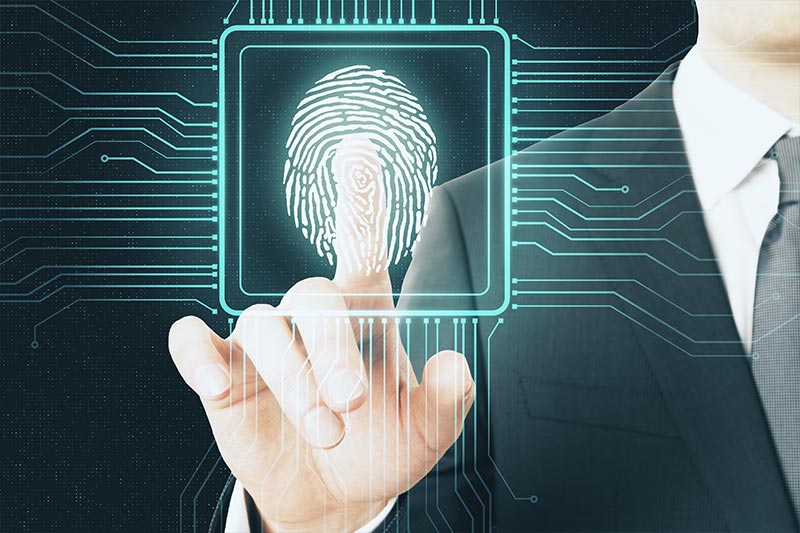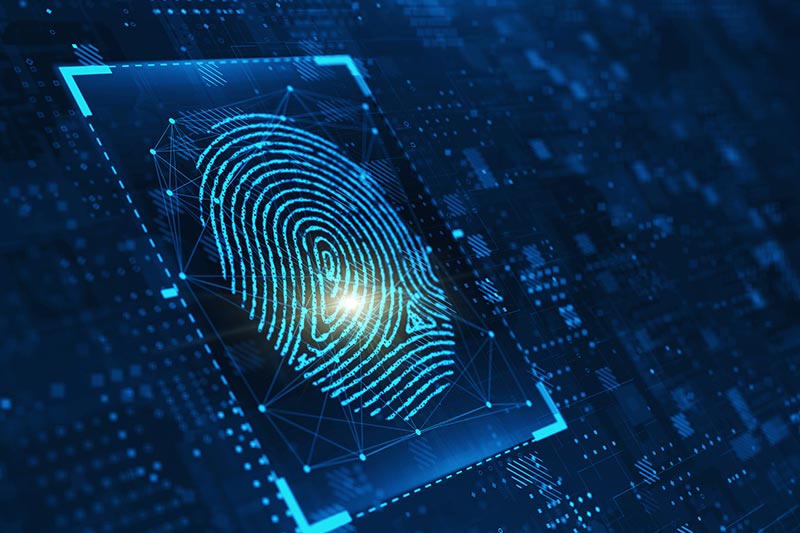Biometric Authentication of Gamers: Secure Confidential Data
About the Concept

This is confirmation of the customer’s identity using unique physiological or behavioural characteristics.
In virtual casinos or betting platforms, the solution is used as an ultra-modern way to:
- comply with legal requirements;
- prevent fraud.
In 2017–2019, operators began to apply the technology for performing KYC and AML procedures. The reason for the innovations was the tightening of legal norms in many EU countries, higher security standards, and requirements for the protection of socially vulnerable individuals.
After COVID-19, verification reached a new level. During the pandemic, offline authentication became impossible in most land-based establishments, so entrepreneurs quickly switched to biometrics.
Today, this method is integrated into many offline and online locations. Business owners add biometrics to speed up KYC and AML procedures, as well as protect their enterprises from fraudsters.
Types of Data Used

The technology is based on the unique anatomical and behavioural characteristics of a client. They cannot be faked or forgotten, like a password, photo, or PIN code.
Biometric details distinguish one person from another and remain stable for a long time.
Physiological Data
For quick and effective identification, programs request the following info:
- Face recognition. This is a scan through the front camera of a smartphone or computer. Then the received file is compared with the photo in the player’s document (passport or ID card). During the check, entrepreneurs analyse the geometry of the face, the distance between the eyes, the shape of the nose and chin, etc.
- Fingerprints. The approach is used in mobile betting apps if access to the account is linked to the biometrics of the phone. A striking example is the authorisation of the profile via the Touch ID program for gadgets with iOS and Android operating systems.
- Iris scan. At the moment, it is rarely used in the gambling niche. This method is actively studied as a more accurate alternative to facial recognition. It is expected that iris scans will soon find application in medicine, pharmaceuticals, banking, and other high-tech industries.
Behavioural Biometrics
This is a secondary verification level that is extremely efficient in the fight against fraud.
The patterns of interaction with the tool include:
- typing speed;
- rhythm and method of touching the screen (for mobile casinos);
- angle of the phone during a gaming session;
- manner of cursor movement or clicks.
Such information is not used directly during the client authentication, but it helps to indicate bots and multiple accounts (in modern anti-fraud systems).
Additional Data
As a verification measure, it is also possible to use:
- Selfie with a document. Gamblers take a picture of themselves with a passport or ID card. The program compares the face, name, date of birth, hologram, MRZ code, and other characteristics to identify a casino visitor. The use of AI and computer vision allows operators to instantly determine the document’s authenticity and the face in the photo.
- Liveness detection. This is a check of the player’s “realness”. The program asks clients to turn their heads, blink, pronounce numbers, and perform other simple actions. Live video protects against fake images and deepfakes, helping to reveal intruders at the registration stage.
Why Gambling is a Priority Area for Biometrics

According to Gitnux, the use of such authentication in the entertainment sector increased by 37% from 2021 to 2023. This is due to an increase in the share of fraudulent and chargeback transactions, as well as stricter requirements from gambling commissions.
Gitnux analysts claim that:
- 35% of casino owners have already integrated biometrics for initial customer verification;
- 65% plan to add this method in 2025–2028.
Let us consider the main reasons why many providers are choosing to apply this technology.
Increased Regulation
In many jurisdictions (especially in North America and Europe), a tightening of legislation takes place. The authorities want entrepreneurs not only to run a business and pay taxes but also, for example, to combat fraud or money laundering.
The strictest requirements for entrepreneurs are put forward by the UK Gambling Commission, Malta Gaming Authority, Spelinspektionen, and other European regulators. In offshore zones, the operating conditions are more lenient but still imply a thorough check of the identity of each client.
Licence holders are required to:
- conduct strict KYC and AML validation;
- prevent underage betting;
- monitor signs of ludomania;
- check the sources of the players’ funds.
Biometrics has become a quick response to the requirements of licensing bodies. The technology allows project managers to adhere to responsible gambling principles and combat cybercriminals.
Threats of Fraud and Multi-Accounting
Such problems cost companies billions of dollars a year.
Providers face the creation of various user profiles, theft of bonuses, the use of fake documents, and bot traffic. The sale of verified accounts on the grey market is also gaining popularity, as a result of which operators lose their reputation and money.
The introduction of biometrics protects the business from fraud by:
- eliminating repeated registrations from one customer (due to the uniqueness of physiological data — face and voice);
- identifying a mismatch between the photo and the real user;
- finding scammers at the login stage.
Acceleration of Verification
A typical KYC procedure takes up to 24–48 hours. The time is mainly spent on checking the passport and approving the application by the administration.
In a highly competitive industry, a long wait becomes critical for the following reasons:
- each extra step reduces the conversion rate on the website;
- a gambler can go to a competitor with a simpler login process.
The introduction of biometrics speeds up the authentication process. It takes 1–3 minutes and does not require any additional actions from clients. For example, players do not need to upload documents manually but simply take a selfie.
The system instantly checks the authenticity and the “liveness” of the face. The application to create an account will be automatically approved.
In Australia, biometric verification takes 1–2 seconds compared to 15–45 seconds in the case of traditional identification methods (SMS, e-mail, etc.). This radically improves the user experience on entertainment sites, reduces the percentage of registration refusals, and decreases customer churn.
Responsible Gaming and Protection of Vulnerable Groups
Regulators and society require operators to take care of:
- players who suffer from ludomania;
- minors;
- socially vulnerable persons.
The solution’s introduction allows comparing people with the details in national databases (in some countries), tracking whether a user is registered in the lists of self-excluded gamblers, and restricting access to the placement of bets for minors.
For example, in the UK, digital casinos should check the age of customers and the sources of funds before they make their first deposits. Biometric checks allow entrepreneurs to do this quickly and without errors.
Mobile Gaming
Modern clients launch the reels in slots through smartphones, and for such a purpose, they often use device biometrics:
- Face ID and Touch ID programs for logging in;
- flexible SDKs in mobile applications;
- binding a gadget to an account for bank transfers and monitoring funds.
The use of the solution is beneficial for both gamblers and operators. For example, customers do not need to enter logins and passwords, so the sessions start in literally 2 clicks. The used devices are checked automatically, as a result of which businessmen do not waste resources on their authentication.
How Market Leaders Implement the Tool

Today, biometric verification is not just a trend but a standard for many software vendors.
Betway
Face ID and Touch ID solutions have been installed in the firm’s apps, making it possible to log in to the system without entering a password. The tools are also applied for re-verification and confirmation of transactions. Players get instant access to their accounts and deposit funds.
The technology’s implementation has several advantages:
- a reduced number of refusals when logging into Betway applications by 18%;
- increased frequency of repeat sessions by 22%.
About 70% of the provider's clients confirm their identity through mobile verification, while the remaining 30% prefer classic authorisation via a login and password.
Kindred Group
The brand has been working with Onfido and iProov, the leading verification software vendors in the market, for many years. Thanks to this cooperation, the company’s gambling platforms can conduct video authentication in real time, comparing the customer's face with their passport.
The process is automated and used during registration, suspicion of fraud, or repeated KYC. The verification time has been reduced from 12 to 2–3 minutes, and the number of scam accounts has decreased by 36%.
Playtech
The manufacturer’s software has been supplemented with an innovative IVS module.
The program automatically includes a liveness check: determination of whether a person is real, not a mask, screen, or bot. Additional authentication is activated for players and staff.
The implementation of the Identity Verification Suite resulted in the complete automation of KYC procedures in mobile applications:
- 70% reduction in the time for verification;
- 25% decrease in the number of contacts with the support service.
Entain
The proprietary Azure CRM solution processes more than 1 billion transactions per day, some of which are related to biometrics. Authentication via facial recognition is an integral part of a large risk analysis system and is maintained by a third-party provider, Veriff.
The implementation of the technology led to the following results:
- increased the accuracy of the detection of multi-accounting cases and bonus hunters;
- improved quality of service for players in high-risk and VIP segments;
- compliance with UKGC and MGA standards.
ClubsNSW
An Australian operator has implemented a facial recognition system in land-based poker rooms. The program compares each visitor with a database of gamblers who participate in voluntary or forced self-exclusion.
The proprietary system’s launch performed the following tasks:
- prevented more than 100 thousand login attempts by violators;
- strengthened the supplier’s social responsibility;
- enhance the confidence of customers and regulators.
The Main Things about Biometrics in the Gambling Industry
Biometric verification is actively used by leading entertainment brands.
Key aspects that entrepreneurs should take into account:
- The advantages of the solution include simpler and faster user identification, as well as protection from fraud. The implementation of the technology helps project owners work in a legal framework and meet the standards of prestigious regulators.
- Top providers successfully test and implement verification using biometrics. These are Betway, Kindred Group, Playtech, Entain, and other well-known casino and sports betting operators.
From us, you can order a multitasking system, which is suitable for work on desktop sites and mobile devices, as well as in land-based halls. We also offer certified slots, payment services, security software, etc.
Check the information used to contact us carefully. It is necessary for your safety.
Fraudsters can use contacts that look like ours to scam customers. Therefore, we ask you to enter only the addresses that are indicated on our official website.
Be careful! Our team is not responsible for the activities of persons using similar contact details.



